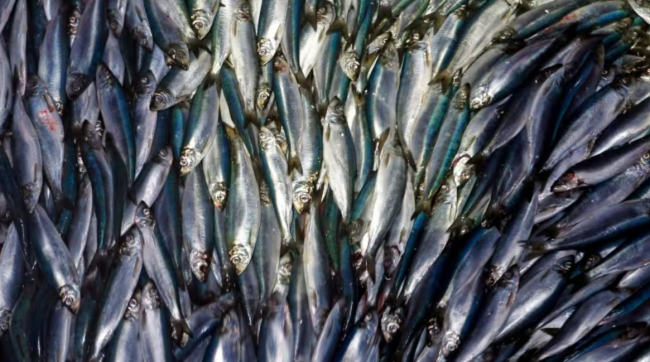Articles Menu

Nov. 22, 2023
Major spending increases and policy changes by the federal government to protect and rebuild wild fish stocks in Canada have resulted in little improvement, according to the 2022 Fishery Audit released this week by environmental group Oceana Canada.
In its sixth annual audit, Oceana says fewer than one third of wild marine fish stocks in Canada are considered healthy and most critically depleted stocks lack plans to rebuild them.
"We're seeing a disturbing lack of change in our marine fish populations despite the investments in rebuilding. We haven't seen the needle move at all and that's really concerning," Oceana science director Robert Rangeley told CBC News.
The audit assessed 194 fish stocks in Canada.
It reports 30 per cent are in the healthy zone — what Fisheries and Oceans Canada (DFO) considers sustainable for fishing — down from 34 per cent in 2017. It says 15 per cent are in the cautious zone, where harvesting should be reduced. The status of 37 per cent of stocks is uncertain.
It also says 17 per cent are in the critical zone, where serious harm is occurring. Less than 20 per cent those critically depleted stocks have plans in place to rebuild them, the report finds. Some continue to have high fishing pressure that risks their recovery.
The audit says 72 per cent of DFO's management documents do not formally consider climate change and that needs to change.
Yet the Liberal government in Ottawa has taken a number of initiatives to improve the situation.
In 2018 the federal government committed over $120 million to improve fish stock provisions under a strengthened Fisheries Act.
That amount is dwarfed by the $3.5 billion over nine years for an Oceans Protection Plan to preserve marine ecosystems, improve marine traffic and incident management and partnerships with Indigenous communities.
This year the federal government enacted regulations that, for the first time, force the minister of Fisheries and Oceans to rebuild dozens of fish stocks if they are or become depleted.
Rangeley says that is a step in the right direction.
"We don't have any rebuilding plans that have been completed and followed under the new regulations. It's one thing to have a rebuilding plan, to have a requirement for a rebuilding plan. But we need that follow through," he said.
The Oceana audit includes several recommendations.
Among them it urges DFO to list more fish stocks for regulatory protection and manage fishing quotas to ensure depleted stocks are rebuilt.
It also wants DFO to integrate ecosystem and climate change impacts into fisheries decisions and make rebuilding depleted forage fish a priority.
Forage fish — including herring, mackerel and capelin — are food for larger fish, sea mammals and seabirds. The audit praises DFO's protection of herring and mackerel, but notes capelin stocks have not been given a chance to recover.
"The department will be reviewing the report's recommendations closely," DFO spokesperson Kat Hallett said in an email response to CBC News.
Hallett said DFO is working on rebuilding plans for major fish stocks in the critical zone, using the precautionary approach to setting quotas for stocks that need them and completing and upgrading management plans for more fish stocks.
DFO has reduced commercial fish quotas and imposed shutdowns to rebuild depleted stocks in 2022.
It shut down the spring herring fishery in the Gulf of St. Lawrence and slashed the herring quota off the Atlantic coast of Nova Scotia and New Brunswick.
Most dramatically, DFO closed the entire east coast Atlantic mackerel fishery.

That decision was welcomed in the Oceana audit — and by other environmental groups — but opposed by some fishing interests.
In Newfoundland and Labrador, there have been widespread claims DFO has underestimated the mackerel population.
"We've never seen mackerel like this before and it's broadly distributed," Keith Sullivan, president of the Food Fisheries and Allied Workers Union in N.L. told the parliamentary Fisheries and Oceans committee on Nov.15. "The closure of the mackerel fishery this year was met with widespread disappointment, as harvesters had experienced increases in catch levels compared to previous years," Sullivan said.
Most depleted stocks are in Atlantic Canada and include groundfish and flatfish, many that have not recovered from widespread collapses in the 1990s
On the east coast, Oceana says Newfoundland and Labrador and the Gulf region each have seven stocks in the critical zone
The Maritimes region, which includes the Atlantic coast of Nova Scotia and New Brunswick, has five stocks in the critical zone.
The Oceana audit says Canada has the pieces in place to rebuild stocks but Rangeley remains skeptical.
"Our expectation with the critical zone stocks is they move quickly on the rebuilding plans and most importantly, make decisions, make management decisions that are consistent with new, real rebuilding plans," he said. "The jury is out."
Reporter - Paul Withers is an award-winning journalist whose career started in the 1970s as a cartoonist. He has been covering Nova Scotia politics for more than 20 years.
[Top photo: Fisheries and Oceans Canada reduced commercial fish quotas and imposed shutdowns to rebuild depleted stocks in 2022. It shut down the spring herring fishery in the Gulf of St. Lawrence and slashed the herring quota off the Atlantic coast of Nova Scotia and New Brunswick. (Robert F. Bukaty/The Associated Press)]